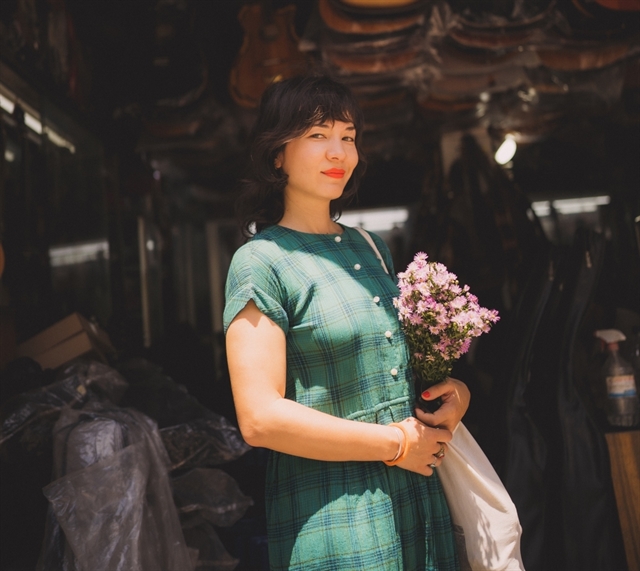 Life & Style
Life & Style

 |
| French-Vietnamese singer Dorothee Hannequin. — Photo coutersy of French Institute of Hà Nội |
French-Vietnamese singer Dorothée Hannequin will perform at Polygon Musik - Complex 01 in Hà Nội tomorrow. The concert is a part of her tour to five cities of Việt Nam beginning with a show in HCM City last week.
Việt Nam News reporter Nguyễn Bình interviews her about the tour in Việt Nam and her role in the Artists' Residence in Villa Sài Gòn currently funded by the French Institute of Hà Nội.
Can you introduce your new album Arlequine which you'll perform during the Việt Nam tour?
Arlequine is my fourth album. I would describe it as "baroque pop". Full of silky arrangements like strings, horns, and pianos, it is inspired by French artists from the 60's and 70's era such as Françoise Hardy, Nino Ferrer and Anne Sylvestre.
The album describes different women and their various personalities.
Your concert in Việt Nam was cancelled in 2020 due to the COVID-19 pandemic. Is it your first concert in your mother’s homeland? How do you feel?
Yes, it's going to be my first show in my mother's homeland. I'm very excited and emotional about it.
Asia is very close to my heart, partly due to my Vietnamese heritage, but also because I like to blend in with a country and live at the local rhythm, instead of just passing through.
I recently spent six weeks with a family in Taiwan, and this gave me a lot to create with. These dialogues with people inspire me in my music.
You've also worked with local musicians in a studio in HCM City. Could you tell more about that?
I was at the Villa Saïgon, an artist residency before the tour. I studied traditional instruments and met some great musicians. I also recorded a lot of sounds during my trip here like mantras, birds, traffic jams and others that I will use in new songs when I go back to France.
Energetic cities in Việt Nam inspire me a lot. I have come to places like pagodas and temples where I hear melodic praying. Plus, I am impressed by the sound of cuckoo birds in Việt Nam.
This residency at Villa Saigon is special for me because my family is half Vietnamese, and it allows me to imagine what their life was like here. So a lot of emotions came out of this residency.
In Việt Nam, I am collaborating with local musicians and recording ambient sounds, both urban and natural, during a six-week residency. At the end of the residency, my touring band joins me and we perform five concerts across the country to present our new album Arlequine.
What songs in Arlequine will you perform at the concerts? And who are the musicians will you perform with?
I will perform most of the songs from this album and a few from Thérianthropie Paradis, my previous album. My supporting musicians will be Jérôme Laperruque on bass guitar, percussionist Antoine Kerninon and keyboardist Mathieu Geghre.
Songs in Arlequine have beautiful melodies containing lots of energy. I think the Vietnamese audience will receive my songs well.
Your first two albums were in English while in the third and Arlequnie, you sing in French. What made you switch to French?
After my second album, I had a new song in mind called Le fantôme de tes pas. I had great feedback about it, so I decided to write this third album in French. Then it really opened my career internationally.
My first two albums were sung in English, which allowed me to play in many countries abroad. But when I switched to French on the third album, it unleashed something, a passion that I didn't have before.
I realise that French, far from being a barrier, exports very well. There is perhaps a bit of my own vision in this since my music evokes, in a certain way, the great artists of the French chanson.
When did you start your music career?
I started playing music at 15 but not until later as a professional, at 27. My parents don't work in the arts but they created an artist space for me in our family and they always encourage me to do what I like.
My parents like music very much. My mother likes singing and my father likes playing drum and piano. They taught me music. My mother took me to ballet class when I was small. Sometimes she took me to casting because she thought my face was suitable for advertisements.
I remember at that time I was shy and I did not feel comfortable. Music makes me confident and bold.
You have performed in many countries. Which concert was the most memorable?
This is a hard question. Most of the time the best shows are the intimate ones where you can see everyone's reaction.
Could you describe the music you are pursuing?
I love to put new instruments in my music and use different languages. I want my music to be timeless so people can listen to it and don't mind when it was composed.
I have learnt from singers such as Henri Salvador, Brigitte Fontaine, Rita Mitsouko, and others. I want my music to be deep like theirs so I focus on lyrics, tone and arrangement techniques.
I think these factors are not used in music today because many artists lost the skill of composing. With technology, people can make music in a studio without much musical knowledge. — VNS




